journey on
New member
Journey On and the E-Z Loader roller trailer are now 9 years old. Time flies when you're having fun. It’s been launched in salt water every year, though we took it to fresh water when we went back to the Great Lakes and the Mississippi River.
So the question is: how are the brakes doing? And that’s what I’m going to describe, just for historical documentation.
In summary, I think the brakes did well. Even in the condition shown below, they stopped the trailer. And being used in salt water, their condition was impressive. Finally, they were easily rebuidable.
Up to this year, I’d replaced the Chinese bearings with Timkens and replaced the pads 3 1/2 years ago. I described in this post: Trailer Brakes /. Just for the record, the brakes are Reliable 6 lug 12” oil filled hubs, with Kodiak calipers and a Carlysile electric brake actuator. Hosed them off with fresh water whenever I could, but if the trailer sat at a launch ramp they often didn’t get washed down.
I pulled the wheels off, using a bar and length of plastic pipe to loosen the nuts. Works a lot better that an impact wrench, doesn’t snap off the studs. Here’s the before shot. Nice shot of rust, though they still stopped, I think.
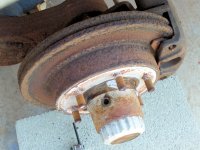
And here’s a close up of the caliper.
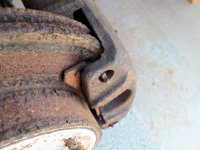
So, now the choice is $650 for new Kodiak hubs and calipers. Or, what can we do to get them through another year or 2? Well, I pulled everything apart. The calipers were rusty on the outside, but the piston slid in smoothly, no leaks, since the pistons are stainless. Ordered new brake pads, they’re ceramics now, which wears forever. Here's a shot of the old and new pads. The old ones don't look that bad
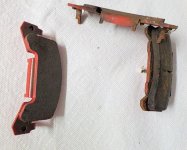
And then I took the discs to the local machine shop. After some discussion as to how long they were under water and when I found them, they surface ground them, as shown below.
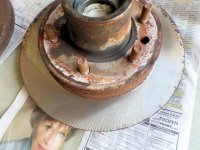
And on one side, the shims I installed where the rubber seals grooved the hub, were grooved themselves. The other side (also sleeved) was good. Go figure. So I had to chisel 2 of them off and install new sleeves. Thought about that for a week, took 5 min with a small chisel.
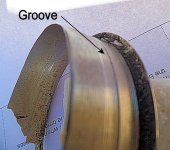
Installed new sleeves, put the hubs on, added oil, installed pads, bolted on the calipers and now the brakes are as shown below.
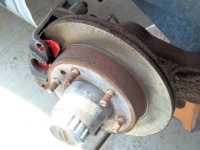
Replaced the brake fluid, sprayed a few rust spots and we’ll now see how that works. For their 9 year anniversary, I’m happy and we’ll see how long this rebuild lasts.
Boris
So the question is: how are the brakes doing? And that’s what I’m going to describe, just for historical documentation.
In summary, I think the brakes did well. Even in the condition shown below, they stopped the trailer. And being used in salt water, their condition was impressive. Finally, they were easily rebuidable.
Up to this year, I’d replaced the Chinese bearings with Timkens and replaced the pads 3 1/2 years ago. I described in this post: Trailer Brakes /. Just for the record, the brakes are Reliable 6 lug 12” oil filled hubs, with Kodiak calipers and a Carlysile electric brake actuator. Hosed them off with fresh water whenever I could, but if the trailer sat at a launch ramp they often didn’t get washed down.
I pulled the wheels off, using a bar and length of plastic pipe to loosen the nuts. Works a lot better that an impact wrench, doesn’t snap off the studs. Here’s the before shot. Nice shot of rust, though they still stopped, I think.

And here’s a close up of the caliper.

So, now the choice is $650 for new Kodiak hubs and calipers. Or, what can we do to get them through another year or 2? Well, I pulled everything apart. The calipers were rusty on the outside, but the piston slid in smoothly, no leaks, since the pistons are stainless. Ordered new brake pads, they’re ceramics now, which wears forever. Here's a shot of the old and new pads. The old ones don't look that bad

And then I took the discs to the local machine shop. After some discussion as to how long they were under water and when I found them, they surface ground them, as shown below.

And on one side, the shims I installed where the rubber seals grooved the hub, were grooved themselves. The other side (also sleeved) was good. Go figure. So I had to chisel 2 of them off and install new sleeves. Thought about that for a week, took 5 min with a small chisel.

Installed new sleeves, put the hubs on, added oil, installed pads, bolted on the calipers and now the brakes are as shown below.

Replaced the brake fluid, sprayed a few rust spots and we’ll now see how that works. For their 9 year anniversary, I’m happy and we’ll see how long this rebuild lasts.
Boris
